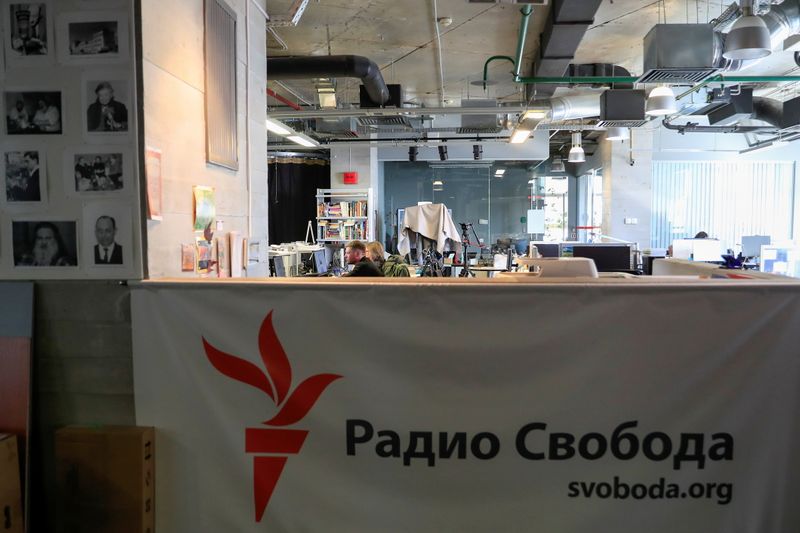MOSCOW (Reuters) – U.S. broadcaster Radio Free Europe/Radio Liberty has appealed to the European Court of Human Rights (ECHR) to order Russian authorities to refrain from enforcing fines on its Moscow bureau that would cause “irreversible harm”.
The U.S. news outlet has been heavily fined this year for what Russia says is its repeated failure to label itself as “performing the functions of a foreign agent”.
RFE/RL says Russian authorities have the power to place it into insolvency and/or block access to its media sites if the fines are unpaid, and that Andrey Shary, director of its Russian service, faces the prospect of a prison sentence of up to two years and personal bankruptcy.
The outlet, which has a network of freelancers across Russia, covers Crimea, which Moscow annexed from Ukraine in 2014, in great detail, and provides extensive coverage – in Russian – of opposition protests and the fate of jailed Kremlin critic Alexei Navalny.
It says it has almost doubled its Russian audience over the last five years.
The standoff has added to friction in Washington’s relations with Moscow, already at post-Cold War lows amid disagreements over Ukraine, Syria, sanctions and the jailing of Navalny.
RFE/RL, which is funded by a grant from the U.S. Congress through the United States Agency for Global Media, says it has full editorial independence, protected by U.S. law, and that the labelling requirement amounts to defacing its own product.
It said fines on its Moscow bureau and Shary could reach some $33 million by year end if they continue at the current rate.
“FOREIGN AGENTS”
However any favourable ruling by the ECHR would likely be largely symbolic as Russia passed a law last year giving its national legislation precedence over international treaties and rulings in cases when they conflict with its constitution.
In February Russia dismissed as unlawful an EHCR ruling demanding Navalny’s release and accused the court of meddling in the Russian judicial system.
Russian authorities have the power to label foreign-funded NGOs, media or individuals they deem are engaged in political activity as “foreign agents”. The term, which carries a negative Soviet-era connotation, requires designees to attach the label to their publications and report their funding and spending.
Russia’s communications watchdog Roskomnadzor said in a statement that compliance with the “foreign agent” law was mandatory and that the label was designed to make clear to a Russian audience that such organisations “pursue the interests of other states”.
In a statement RFE/RL President Jamie Fly said: “We are hopeful that the European Court of Human Rights will view these actions by the government of Russia for what they are: an attempt to suppress free speech and the human rights of the Russian people.”
During the Cold War, the outlet, which was founded in the 1950s and was initially funded via the CIA, was for years at odds with Soviet authorities. After the 1991 Soviet breakup, President Vladimir Putin’s predecessor in the Kremlin, Boris Yeltsin, invited RFE/RL to open an office in Russia.
(Reporting by Andrew Osborn and Maxim Rodionov; Writing by Gabrielle Tétrault-Farber and Tom Balmforth; Editing by Gareth Jones and David Holmes)




















